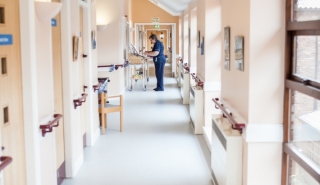Laboratory Medicine
General Information / Request form and specimen labelling
Any samples that do not meet the labelling standards (or samples where the information is illegible) may be rejected.
Where insufficient details are provided on the request form and specimen itself, the analysis of the specimen may be severely delayed or completely rejected with the exception of Cellular Pathology tissue samples . Unlabelled tissue samples of this nature will be verified by the clinician attending the laboratory.
Complete the request form for the department carrying out the analysis required. It is the responsibility of the requester to ensure the form is completed fully whenever possible with details preferably printed in capitals. Identifiers must be correctly spelt and complete, for example, initials are insufficient as is age of patient or just a year of birth.
For guidance concerning labelling of High Risk/Danger of Infection Specimens Click Here
| Request Form and Specimen Labelling | Additional Information on Request Form |
|---|---|
| Surname* | Patient's current location |
| Forename* | Consultant/GP |
| Date of Birth* | Patient's address |
| NHS Number** | Patients gender and if pregnant |
| Time & Date Taken | Clinical Details |
| Samples for blood transfusion must be signed by the person taking the blood. | Drug History (Dose and time of last dose for drug assays) |
|
Antibiotic history (vital as part of any microbiology request) |
|
| Type and site of specimen (as appropriate) | |
| High Risk status | |
| Referring clinician and contact details (especially important for ALL Immunology Specimens) | |
| The name of the requestor, who should normally be medical, must be provided to satisfy requirements for consent to test. This is particularly important for sensitive tests such as HIV, syphilis, chlamydia etc. |
* Denotes minimum Trust requirements for sample labelling
** The NHS or Hospital Number is essential for all transfusion requests and preferable on all samples. The Laboratory Medicine computer system uses the NHS number as the primary patient identifier so that all data can be linked and patients identified, with accuracy as mandated by the National Patient Safety Agency and NHS England.
Click here for the Trust Policy for Completing Request Forms and Labelling Samples
For tips to avoid barcode problems - Click Here
Blood Transfusion
If a patient is unidentified A/E now generate a hospital case note number for the patient rather than using an AE number ( as this is not unique for the patient through the hospital stay.) The surname must be given as UNKNOWN and the gender of the patient entered in the forename box.
Andrology Request Form
All specimens must be accompanied by a request form. For guidance on completing request forms for semen samples and vasectomy samples - Click Here
Microbiology Request Form
The generic test ‘culture and sensitivity’ has been removed from the Microbiology request form. For samples such as swabs, faeces and sputa the default test is culture and sensitivity and will be done automatically. If you require a specialised test such as TB culture on a sputum sample then tick the TB culture option on the request form.
Cellular Pathology Request Form
All specimens must be accompanied by a request form. All details on the request forms should be completed together with results of relevant investigations in order to provide an adequate clinical history. Any therapy which may alter histological appearances should also be detailed on the request form.
Cellular Pathology Specimen Labels
Specimen labels must indicate the name of the patient, the ward, the nature of specimen and other relevant information. The laboratory cannot take responsibility for unlabelled specimens.
Web page 20 last updated: 06/09/2022
Advice for Requesters - Cervical Cytology
How to Send Samples to the Lab
Advice for Requestors - Immunology
Advice for Requesters- Microbiology
Guidance on test interpretation- Clinical Biochemistry
Transportation of Samples and Postage
High Risk/Danger of Infection Samples
Request form and specimen labelling






